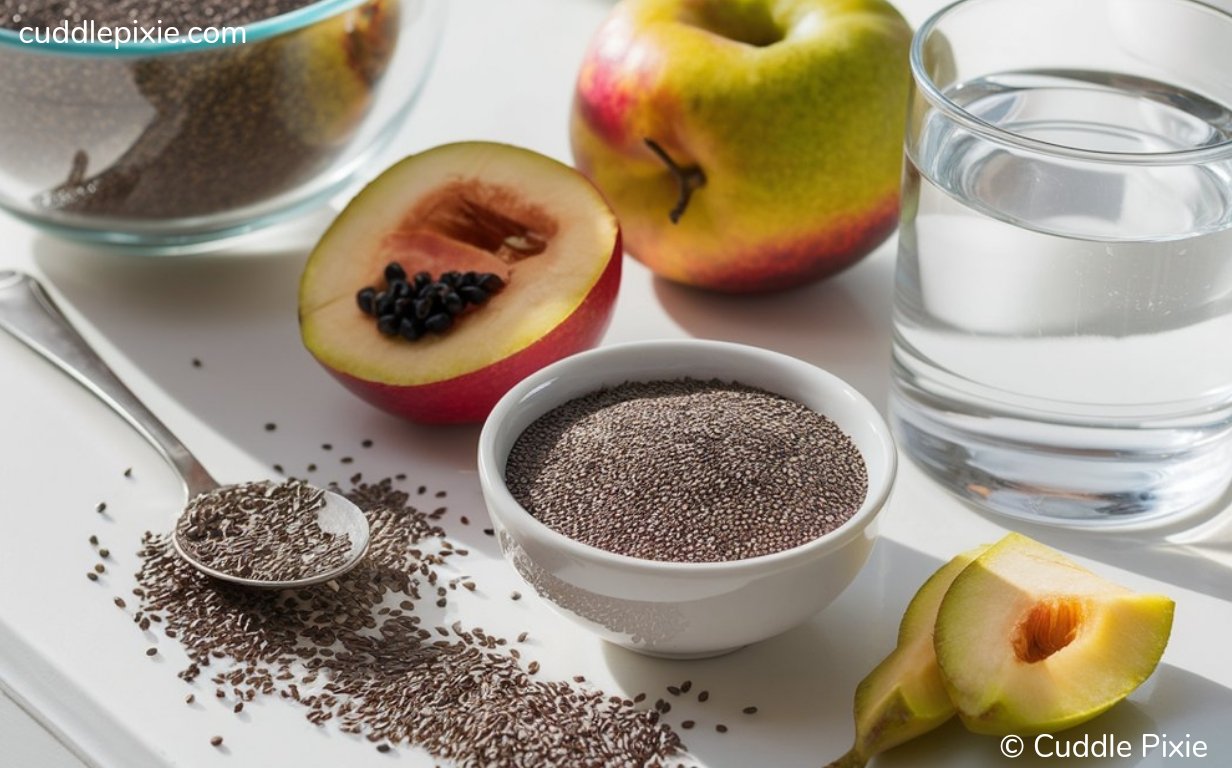Chia seeds, small but mighty, have become increasingly popular in the world of baby nutrition. Known for their rich nutritional profile and numerous health benefits, these tiny seeds are often recommended as a healthy addition to a baby’s diet. In this comprehensive guide, we’ll explore why chia seeds are good for babies, how they can benefit your little one, and the best ways to incorporate them safely into their meals.
In This Article
What Are Chia Seeds?
Chia seeds are derived from the plant Salvia hispanica, which is native to Central America. Historically, chia seeds were a staple food for the Aztecs and Mayans, valued for their energy-boosting properties. Today, they are celebrated for their exceptional nutritional profile and versatility.
Nutritional Profile of Chia Seeds
Chia seeds are a powerhouse of nutrients. They are rich in:
- Omega-3 Fatty Acids: Essential for brain and eye development in babies.
- Dietary Fiber: Promotes healthy digestion and helps prevent constipation.
- Protein: Supports growth and development.
- Calcium and Magnesium: Important for bone health and development.
- Antioxidants: Protect the body from free radical damage.
- Iron and Zinc: Essential for immune function and growth.
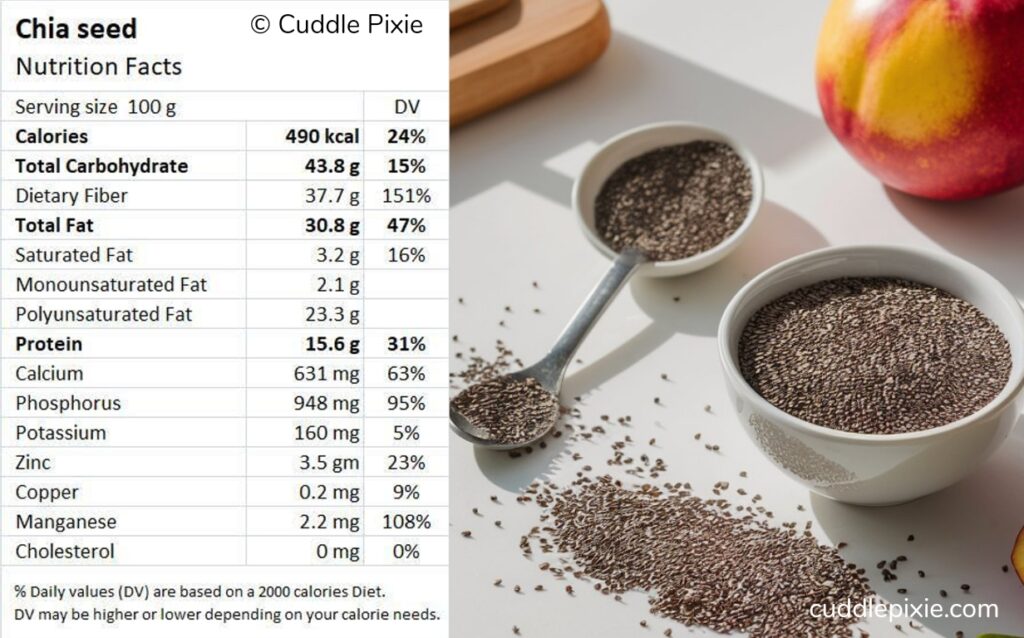
Why Chia Seeds are Good for Babies?
Chia seeds offer numerous benefits for babies, making them a fantastic addition to a balanced diet.
1. Omega-3 Fatty Acids for Brain Development
Chia seeds are one of the richest plant-based sources of omega-3 fatty acids, specifically alpha-linolenic acid (ALA). Omega-3s are crucial for brain development and cognitive function in infants. Studies have shown that adequate omega-3 intake during infancy is associated with improved neurodevelopmental outcomes .
2. Fiber for Digestive Health
The high fiber content in chia seeds aids in maintaining a healthy digestive system. Fiber adds bulk to stools, helping to prevent constipation—a common issue in infants. This can be particularly beneficial for babies transitioning to solid foods .
3. Protein for Growth
Protein is essential for the growth and repair of tissues. Chia seeds provide a good amount of plant-based protein, which can supplement the protein intake from other foods and support healthy growth in babies .
4. Calcium and Magnesium for Strong Bones
Chia seeds are an excellent source of calcium and magnesium, both vital for bone development. These minerals help in building strong bones and teeth, which is critical during the rapid growth phases of infancy .
5. Antioxidants for Immune Support
Rich in antioxidants, chia seeds help protect the body from oxidative stress. Antioxidants play a role in supporting the immune system and overall health of babies .
When and How to Introduce Chia Seeds to Babies
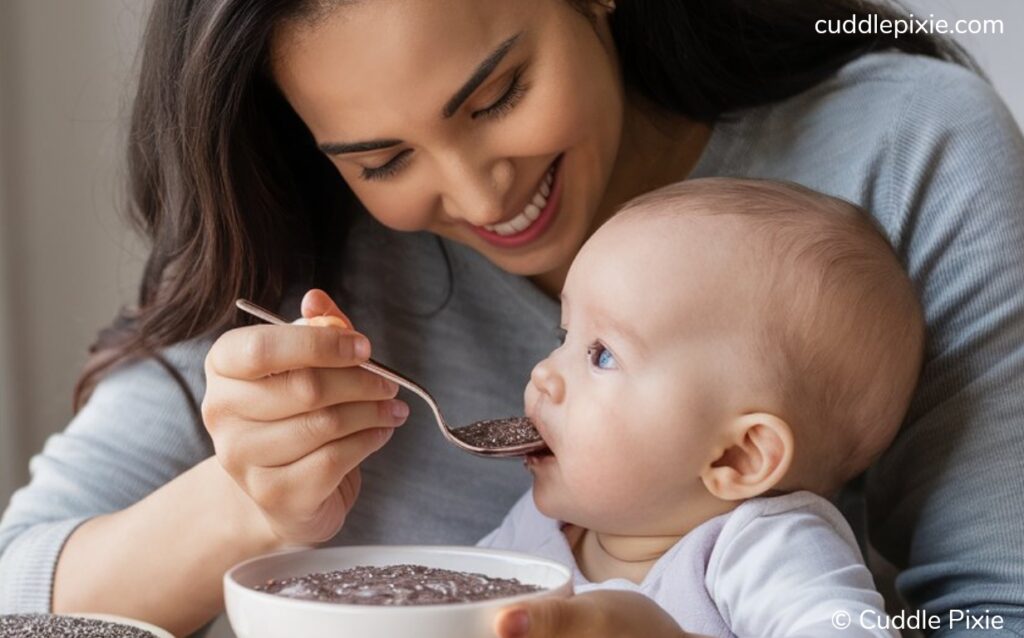
Chia seeds can be introduced to babies around six months of age when they begin eating solid foods. However, it is important to consult with a pediatrician before introducing any new food to ensure it is appropriate for your baby’s specific needs and development stage.
How Much Chia Seeds for Baby?
When introducing chia seeds, start with small amounts to ensure your baby can tolerate them. A safe starting portion is about 1 teaspoon mixed into their food. Gradually increase the amount to 1 tablespoon per day as they get accustomed to the texture and taste .
How to Incorporate Chia Seeds into Baby’s Diet
Chia seeds are incredibly versatile and can be added to a variety of foods. Here are some creative ways to include them in your baby’s meals:
1. Chia Pudding
Soak chia seeds in milk or a dairy-free alternative (such as almond or oat milk) overnight to create a soft, pudding-like consistency. Add pureed fruits like banana or apple for natural sweetness and flavor.
2. Smoothies
Blend chia seeds into fruit or vegetable smoothies for an added nutritional boost. This is a great way to introduce new flavors and textures to your baby.
3. Baby Cereal
Mix chia seeds into oatmeal or rice cereal. The seeds will absorb liquid and soften, making them easier for your baby to digest.
4. Yogurt
Stir chia seeds into yogurt for a nutrient-dense snack. You can add a touch of cinnamon or vanilla for extra flavor.
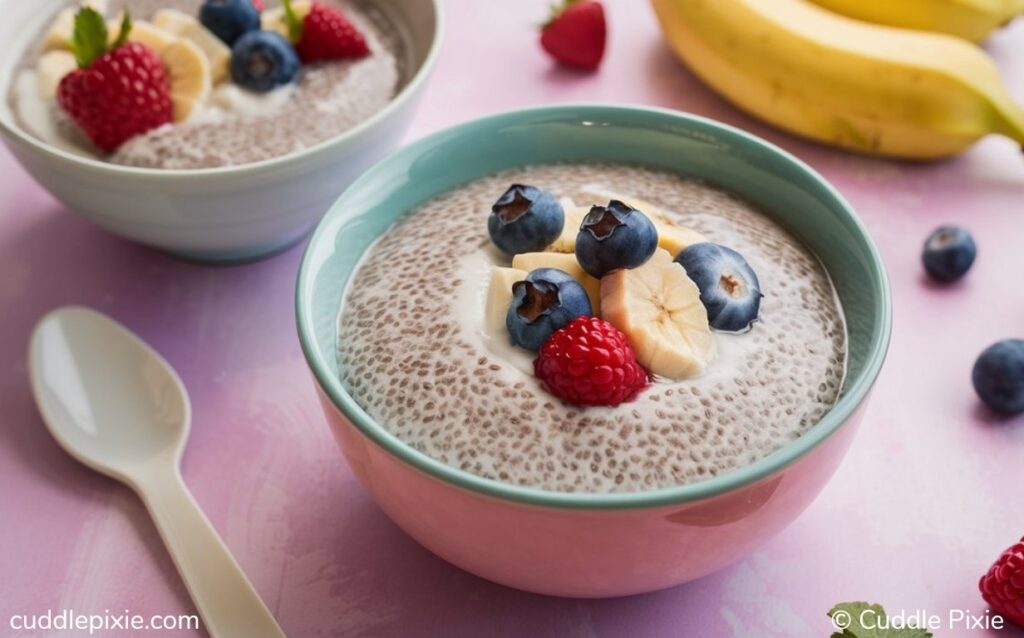
Chia Seeds and Constipation: Do They Help Babies Poop?
Chia seeds are highly effective in preventing and relieving constipation in babies due to their high fiber content. When chia seeds are soaked in liquid, they form a gel-like substance that adds bulk to stools, facilitating easier bowel movements .
Safety Considerations for Chia Seeds
While chia seeds are generally safe for babies, there are a few safety considerations to keep in mind:
1. Choking Hazard
Ensure chia seeds are fully hydrated before serving to reduce the risk of choking. When soaked, chia seeds expand and soften, making them safer for babies to consume .
2. Allergies
Although rare, some babies may have an allergic reaction to chia seeds. Introduce them gradually and watch for signs of allergies, such as rash, vomiting, or diarrhea. If you suspect an allergic reaction, stop feeding them chia seeds and consult a healthcare professional.
Tips for Introducing Chia Seeds
- Start Slow: Begin with a small amount to see how your baby responds.
- Mix with Familiar Foods: Combine chia seeds with foods your baby already enjoys to make the introduction smoother.
- Observe Reactions: Monitor your baby for any adverse reactions when introducing new foods.
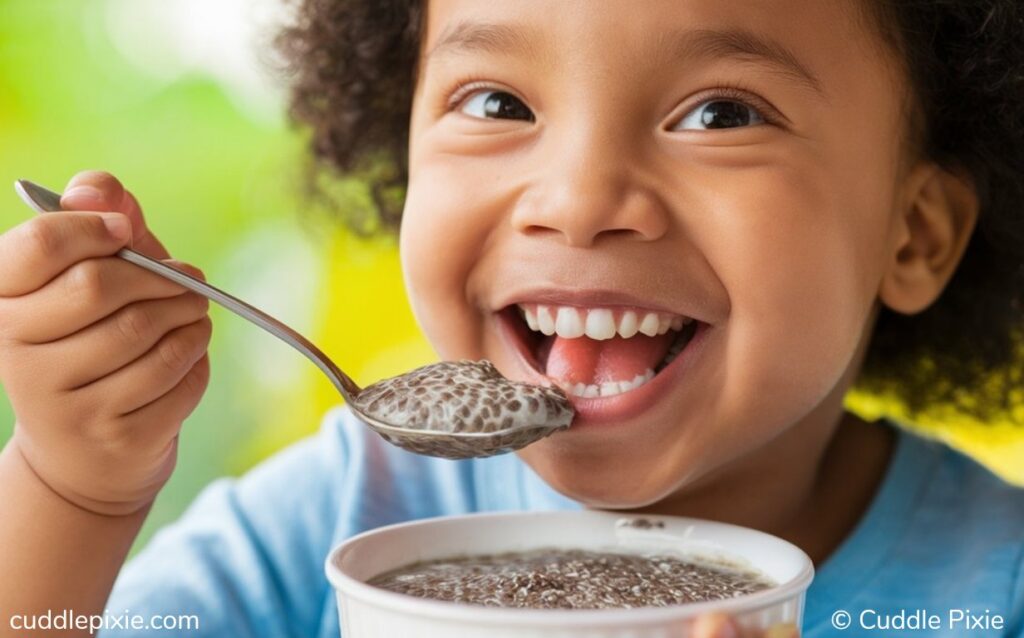
Nutritional Comparisons: Chia Seeds vs. Other Seeds
Chia seeds are often compared to other seeds like flaxseeds and hemp seeds. Here’s a quick comparison:
- Chia Seeds vs. Flaxseeds:
- Both are high in omega-3 fatty acids, but chia seeds are easier to digest whole.
- Flaxseeds require grinding to release their full nutritional benefits.
- Chia Seeds vs. Hemp Seeds:
- Hemp seeds contain more protein but less fiber than chia seeds.
- Both seeds offer unique nutritional benefits and can be used interchangeably in many recipes .
FAQs About Chia Seeds for Babies
Can I Give My Baby Chia Seeds Every Day?
Yes, chia seeds can be given daily, provided they are part of a balanced diet. Ensure you do not exceed the recommended serving size to avoid digestive discomfort.
Do I Need to Soak Chia Seeds Before Giving Them to My Baby?
Yes, it is recommended to soak chia seeds before serving to reduce the risk of choking and aid digestion.
Are There Any Side Effects of Chia Seeds for Babies?
Chia seeds are generally well-tolerated, but excessive consumption can lead to digestive issues like bloating or diarrhea. Stick to recommended serving sizes to avoid any potential side effects.
Final Thoughts
Chia seeds are a nutritious and versatile addition to your baby’s diet, offering numerous health benefits from brain development to digestive health. With proper preparation and serving sizes, they can be safely incorporated into a variety of meals, providing essential nutrients that support your baby’s growth and development. Always consult with a healthcare provider before introducing new foods to ensure they align with your baby’s dietary needs. Embrace the journey of exploring new tastes and textures with your little one, and enjoy the health benefits that chia seeds bring to the table.
References
- Omega-3 Fatty Acids and Brain Development – NCBI
- Benefits of Dietary Fiber – Harvard Health
- Protein Needs for Infants – American Academy of Pediatrics
- Calcium and Magnesium for Bone Health – NIH
- Antioxidants and Immune Health – Mayo Clinic
- Serving Sizes for Babies – Solid Starts
- Chia Seeds and Digestive Health – WebMD
- Chia Seed Preparation – Healthline
- Chia vs. Flax vs. Hemp Seeds – Harvard Health
- Potential Side Effects of Chia Seeds – Cleveland Clinic
